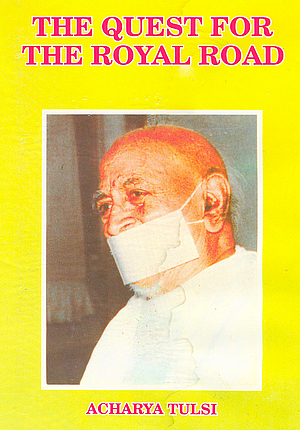Bhagwan Mahavira was a visionary of truth. He realised truth, understood it and put it into practice. The truth of which he gave expression was backed by a sense of equanimity. The philosophy based on an equanimous attitude is as difficult to practice as itis easy and attractive to express. Bhagwan Mahavira absorbed within himself this abstruse philosophy because he was a profound philosopher who did not lack in practical sense. He made no distinction in his way of precept and practice. Seeing unity in diversity and diversity in unity were the culmination of his way of thinking. He considered any kind of one-sided insistence an obstruction on the way of realising Truth. Truth is not confined within any limits. Every individual has a right to realise and worship Truth. Limitations of community, caste, province, sex, etc. cannot divide Truth. Truth is something which is easily available to all like light, sun and air.
The principle of soul is the very basis of the Truth discovered by Bhagwan Mahavira. It is only after accepting the existence of the soul that any talk about engaging in the virtue and abstaining-from the vice can be comprehended. The soul exists eternally existed in the past, exists in the present and will last in the future. The process of creation and destruction can take place only because the soul is eternal. Because the soul exists in all the three times, it is imperishable. The acceptance of the existence of the soul as an independent entity establishes the independence of its capacity to act. Where there is action, reaction is natural. For every action, the soul has also to face the reaction. The results of the previously performed actions and the good or evil actions being performed in the present, prove the theory of reincarnation. The process of birth and death continues so long as the living being continues accumulating good and evil karma. When an individual reaches the stage when his bound karmas are totally exhausted and influx of new karmas is totally, he attains the state of supreme samadhi (i.e., bliss). The words like liberation, salvation, etc. express only such a right knowledge of the Ultimate Truth, right faith in the Ultimate Truth and right conduct in conformity with the Ultimate Truth, are the best means to attain salvation. When one is liberated, the chain of bondages is broken. The current of infinite joy and infinite power begins to flow. A liberated being is never reborn in the world.
Bhagwan Mahavira gave a three-point comprehensive plan of non-violence, non-accumulation and absolution in the context of self-realisation. These three formulae have brought Bhagwan Mahavira from the philosophical heights to the ground of practical living. When the unpractised truth and unattained reality are practised in life and become attainable, they come down to practical life and philosophy becomes science. Ordinary people find it difficult to comprehend philosophical truths. As a matter of fact, the subject of philosophy is very complex. The greatest complexity is in believing a complex thing to be complex. Philosophy too can be easily comprehended and grasped, provided the assumption of complexity attached to it is changed.
Bhagwan Mahavira lived only at the individual level during the early phase of his period of sadhana. The individual is alone, and at that stage, the social controls has no meaning. The acceptance of collective consciousness easily restrict the individual within certain limitations. The secret of successful community life lies in tolerance. A tolerant individual never loses his sense of equilibrium in either favourable or adverse situations. It is very essential to develop the qualities of forgiveness, simplicity, softness, etc. to have tolerance. Among the ten dharmas practice of righteousness and forgiveness is placed the highest. Simplicity and softness can grow only in the periphery of forgiveness.
The basis of Bhagwan Mahavira's practicality is his accepted principle of equanimity. He drew a line of distinction between the two categories of sadhana. The first category is that of the sadhakas who are completely devoted to sadhana and who whole-heartedly pursue the path of non-violence, truth, non-stealing, celibacy and non-possession. The persons in the second grade observe these vows as much as possible:
The first vow includes avoidance of killing anyone, behaving cruelly with others, avoidance of inhuman actions like killing or keeping in bondage dependent beings etc.
The second vow requires one to strictly follow the path of truth in profession and in practical life. The use of deceitful and cruel language symbolises killing of the self. Going back on the promise, the use of satirical language is a state of turning away from the soul.
The third vow tells about rectifying one's tendencies that encourage one's proclivity to steal.
The fourth vow is about keeping control over sexual indulgence. According to this vow, it is a sin to encourage prostitution. The institution of marriage is accepted by the society and violation of its conduct leads an individual astray.
The fifth vow is non-possession. Wealth is accumulated for meeting the needs, but exploitation and too much of accumulation of wealth are pain for the society. Wealth is a means to live, it is not the object to be achieved.
When the means are seen as the end, many complications arise. If those who have faith in Bhagwan Mahavira, and who regard his principles as ideals and those who favour living an ideal life and wish to reinstate human values accept that they would not earn money through immoral means and would not exploit anyone, most of the difficulties would be probably solved.
I bow respectfully to the brilliant soul of Bhagwan Mahavira on the sacred occasion of his birthday celebrations. The philosophical aspect of his life has greatly influenced my mind. Similarly, I also consider his practical thinking as ideal.
The co-ordination of philosophy and practical living would result in our own development as well as the development of society. We would then become Bhagwan Mahavira's true followers.
 Acharya Tulsi
Acharya Tulsi
